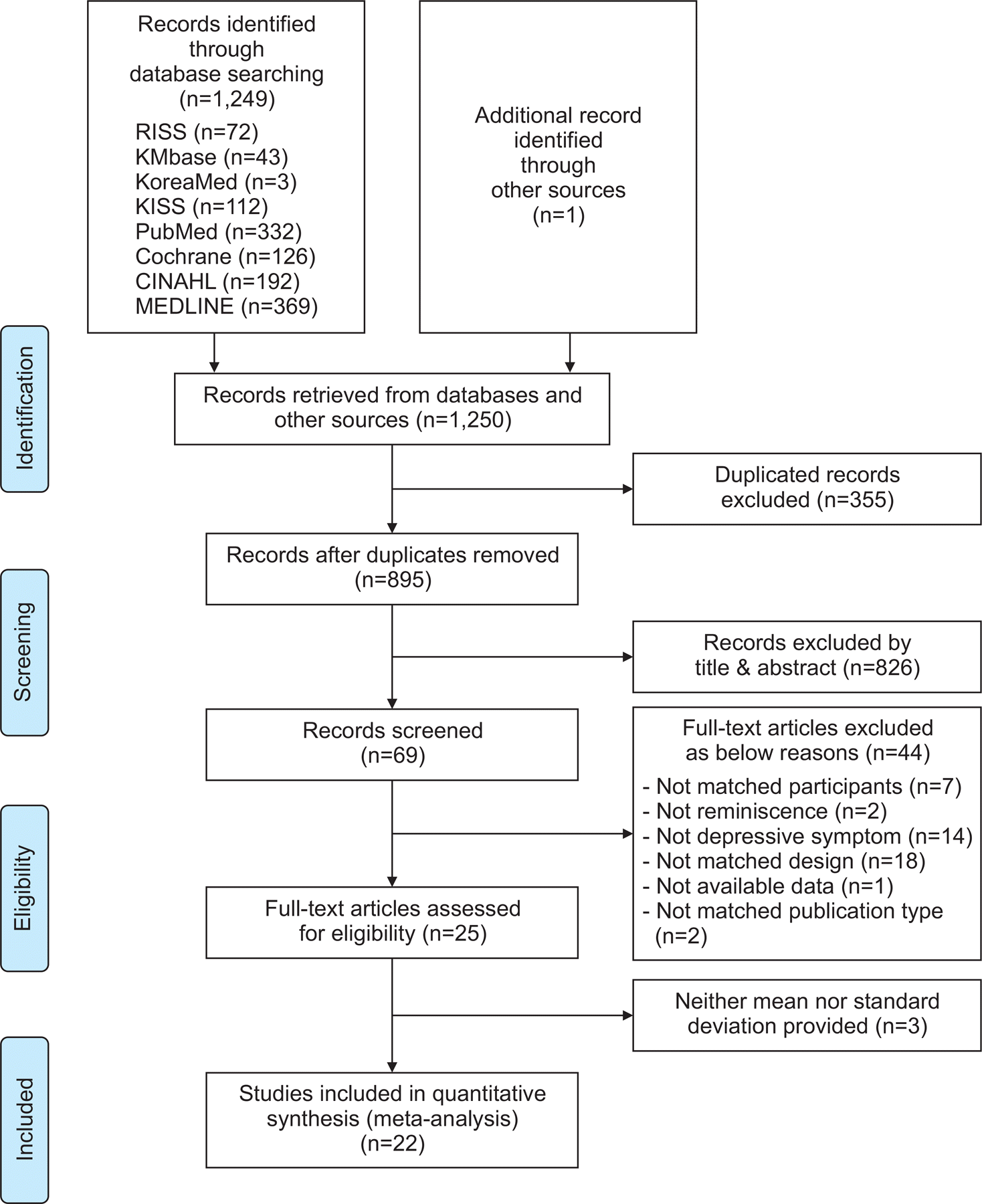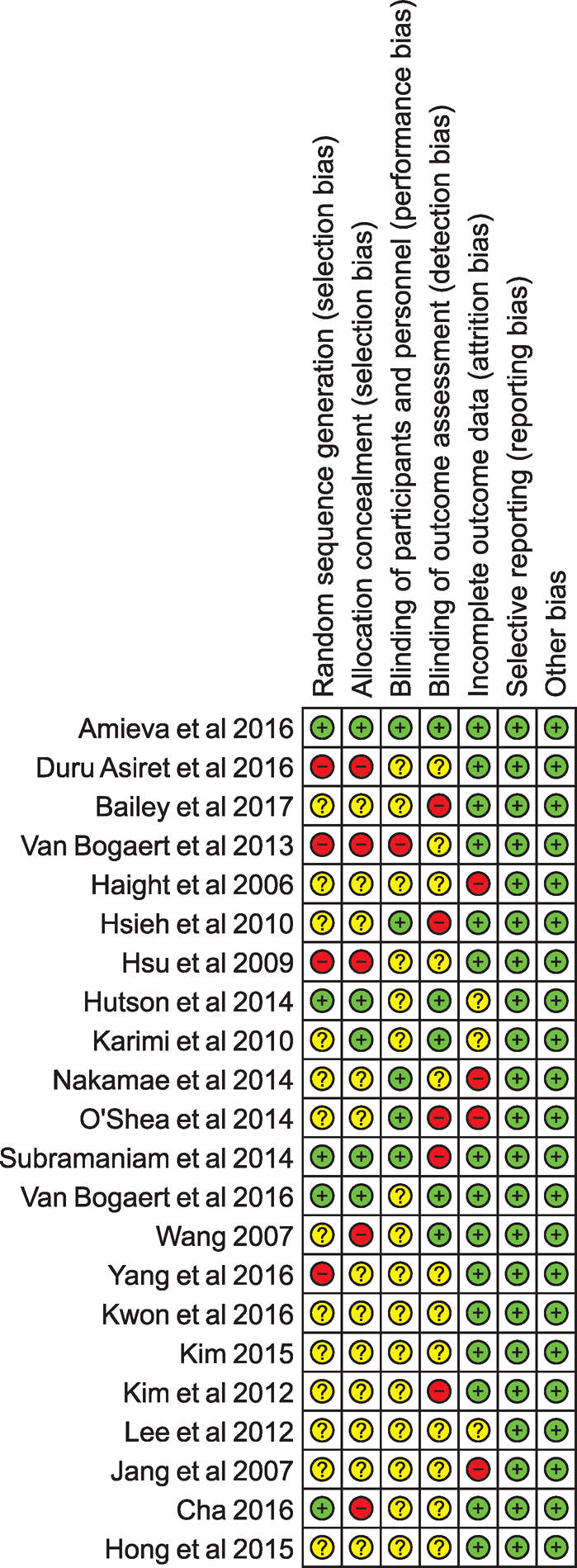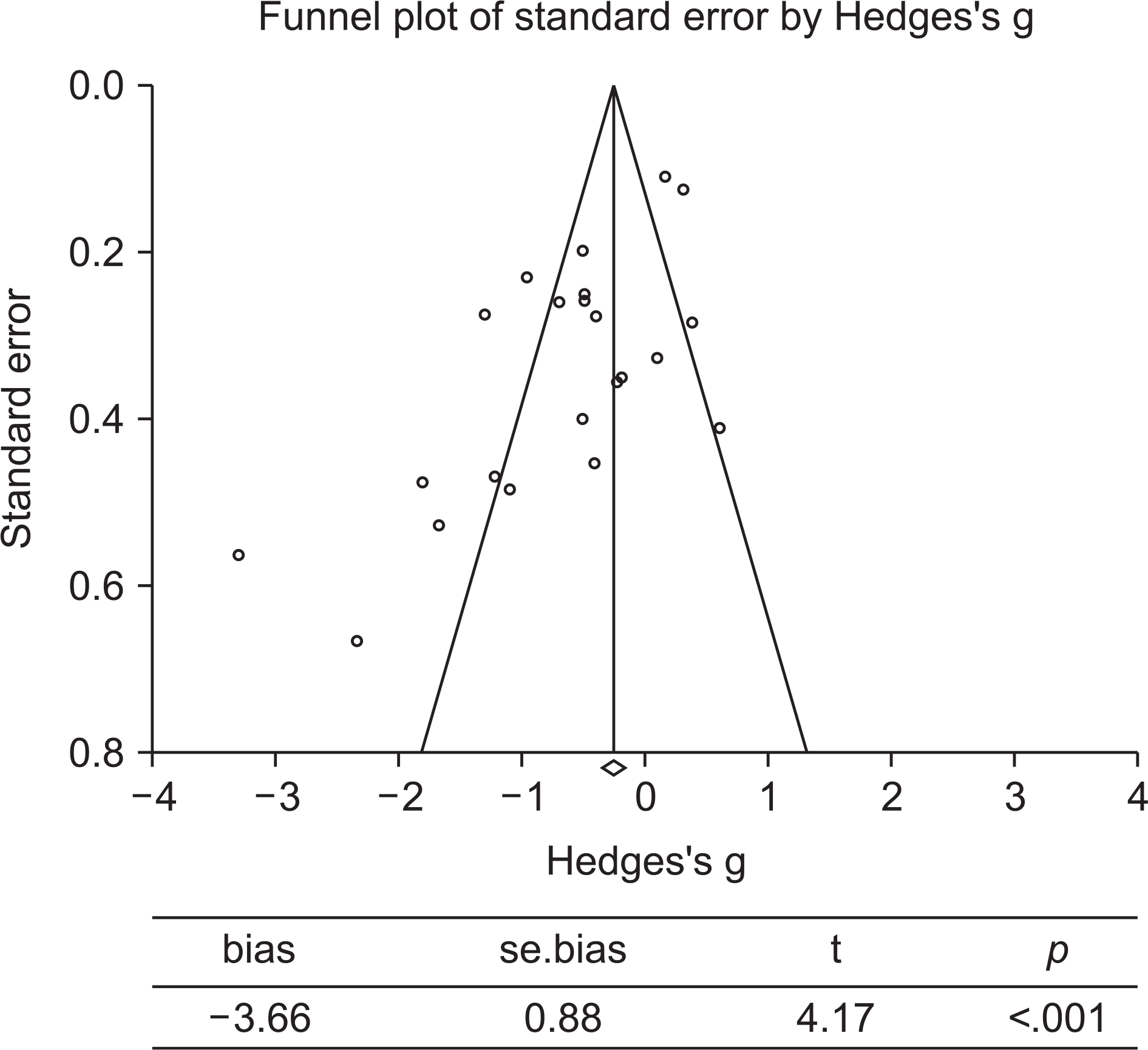Abstract
Purpose
The purpose of this study was to evaluate the effects of reminiscence therapy on depressive symptoms in older adults with dementia using a systematic review and meta-analysis.
Methods
Randomized controlled trials (RCTs) published from January 2000 to January 2018 were searched through Research Information Sharing Service (RISS), Korean Studies Information Service System (KISS), Korean Medical Database (KMbase), KoreaMed, PubMed, Cochrane Library, Cumulative Index to Nursing and Allied Health Literature (CINAHL), and Ovid MEDLINE. Two researchers independently performed the search, selection, and coding. Comprehensive Meta-Analysis 3.0 was used for meta-analysis, and Review Manager program 5.3 was used for quality assessment.
Results
Out of the 1,250 retrieved articles, 22 RCTs were selected for analysis. The overall effect size of reminiscence therapy for mitigating depressive symptoms in older adults with dementia was -0.62 (95% Cl: -0.92 to -0.31). The effect size was greater in older adults under 80, those with less disease severity, and those for whom the therapy session lasted less than 40 minutes.
Conclusion
Reminiscence therapy is an effective non-pharmacological therapy to improve depressive symptoms in older adults with dementia. Because its effectiveness is also influenced by age, disease severity, and application method, it is necessary to consider treatment designs based on individual characteristics as well as methodological approaches.
References
1. United Nations (UN). World population prospects: The 2017 revision, key findings and advance tables [Internet]. New York (NY): UN;c2017. [cited 2017 Nov 24]. Available from:. https://esa.un.org/unpd/wpp/Publications/Files/WPP2017_KeyFindings.pdf.
2. Statistics Korea. Population in old ages 2018 [Internet]. Daejeon: Statistics Korea;c2018. [cited 2018 Feb 21]. Available from:. http://kosis.kr/search/search.do#.
3. Oh YH. The health status of older Koreans and policy consideration [Internet]. Sejong: Korea Institute for Health and Social Affairs (KIHASA);c2015. [cited 2018 Mar 1]. Available from:. https://www.kihasa.re.kr/web/publication/periodical/view.do?menuId=48&tid=38&bid=19&aid=378&ano=4.
4. National Institute of Dementia. Korean dementia observatory 2017 [Internet]. Seongnam: National Institute of Dementia;c2018. [cited 2018 Feb 1]. Available from:. https://www.nid.or.kr/info/dataroom_view.aspx?bid=172.
5. National Institute of Dementia. The prevalence of dementia in ages 65 and above 65 2018 [Internet]. Seongnam: National Institute of Dementia;c2018. [cited 2018 Feb 1]. Available from:. https://www.nid.or.kr/info/ub_2017.aspx?no=3115.
6. World Health Organization (WHO). Dementia: A public health priority [Internet]. Geneva: WHO;c2012. [cited 2018 Feb 1]. Available from:. http://apps.who.int/iris/bitstream/10665/75263/1/9789241564458_eng.pdf?ua=1.
7. Ministry of Health & Welfare (MOHW). The 3rd national dementia plan (‘16-’20) [Internet]. Sejong: MOHW;c2015. [cited 2017 Mar 3]. Available from:. http://www.mohw.go.kr/react/jb/sjb030301vw.jsp?PAR_MENU_ID=03&MENU_ID=0319&-CONT_SEQ=330876&page=1.
8. Gagliese L, Gauthier LR, Narain N, Freedman T. Pain, aging and dementia: Towards a biopsychosocial model. Progress in Neuro-Psychopharmacology and Biological Psychiatry. 2018; 87(Part B):207–215. https://doi.org/10.1016/j.pnpbp.2017.09.022.

9. Bailes CO, Kelley CM, Parker NM. Caregiver burden and perceived health competence when caring for family members diagnosed with Alzheimer’s disease and related dementia. Journal of the American Association of Nurse Practitioners. 2016; 28(10):534–540. https://doi.org/10.1002/2327-6924.12355.

10. Farina N, Page TE, Daley S, Brown A, Bowling A, Basset T, et al. Factors associated with the quality of life of family carers of people with dementia: A systematic review. Alzheimer’s & Dementia. 2017; 13(5):572–581. https://doi.org/10.1016/j.jalz.2016.12.010.

11. Goodarzi ZS, Mele BS, Roberts DJ, Holroyd-Leduc J. Depression case finding in individuals with dementia: A systematic review and meta-analysis. Journal of the American Geriatrics Society. 2017; 65(5):937–948. https://doi.org/10.1111/jgs.14713.

12. Huang SS, Liao YC, Wang WF. Association between caregiver depression and individual behavioral and psychological symptoms of dementia in Taiwanese patients. Asia‐Pacific Psychiatry. 2015; 7(3):251–259. https://doi.org/10.1111/appy.12175.

13. Balieiro AP Jr, Sobreira EST, Pena MCS, Silva-Filho JH, do Vale FAC. Caregiver distress associated with behavioral and psychological symptoms in mild Alzheimer’s disease. Dementia & Neuropsychologia. 2010; 4(3):238–244. https://doi.org/10.1590/S1980-57642010DN40300013.
14. Lima-Silva TB, Bahia VS, Carvalho VA, Guimarães HC, Car-amelli P, Balthazar ML, et al. Neuropsychiatric symptoms, caregiver burden and distress in behavioral-variant frontotemporal dementia and Alzheimer’s disease. Dementia and Geriatric Cognitive Disorders. 2015; 40(5-6):268–275. https://doi.org/10.1159/000437351.

15. Janus SI, van Manen JG, van Til JA, Zuidema SU, IJzerman MJ. Pharmacological and non-pharmacological treatment preferences of healthcare professionals and proxies for challenging behaviors in patients with dementia. International Psychogeriatrics. 2017; 29(8):1377–1389. https://doi.org/10.1017/S1041610217000485.

16. Schneider LS, Dagerman KS, Insel P. Risk of death with atypical antipsychotic drug treatment for dementia: Meta-analysis of randomized placebo-controlled trials. JAMA. 2005; 294(15):1934–1943. https://doi.org/10.1001/jama.294.15.1934.
17. Cooke M, Moyle W, Shum D, Harrison S, Murfield J. A randomized controlled trial exploring the effect of music on quality of life and depression in older people with dementia. Journal of Health Psychology. 2010; 15(5):765–776. https://doi.org/10.1177/1359105310368188.

18. Forbes D, Blake CM, Thiessen EJ, Peacock S, Hawranik P. Light therapy for improving cognition, activities of daily living, sleep, challenging behaviour, and psychiatric disturbances in dementia. Cochrane Database of Systematic Reviews. 2014; (2). CD003946. https://doi.org/10.1002/14651858.CD003946.pub4.

19. Ledger AJ, Baker FA. An investigation of long-term effects of group music therapy on agitation levels of people with Alzheimer’s disease. Aging & Mental Health. 2007; 11(3):330–338. https://doi.org/10.1080/13607860600963406.

20. Lövheim H, Sandman PO, Karlsson S, Gustafson Y. Behavioral and psychological symptoms of dementia in relation to level of cognitive impairment. International Psychogeriatrics. 2008; 20(4):777–789. https://doi.org/10.1017/S1041610208006777.

21. Starr JM, Lonie J. Relationship between behavioural and psychological symptoms of dementia and cognition in Alzheimer’s disease. Dementia and Geriatric Cognitive Disorders. 2007; 24(5):343–347. https://doi.org/10.1159/000108632.

22. Butler RN. The life review: An interpretation of reminiscence in the aged. Psychiatry. 1963; 26(1):65–76. https://doi.org/10.1080/00332747.1963.11023339.

23. Woods B, Spector AE, Jones CA, Orrell M, Davies SP. Reminiscence therapy for dementia. Cochrane Database of Systematic Reviews. 2005; (2). CD001120. https://doi.org/10.1002/14651858.CD001120.pub2.

24. Kim SM. Effects of group art therapy using reminiscence techniques on cognitive functions, depression and self-expression of elderly with dementia. Korean Journal of Art Therapy. 2015; 22(2):603–634.
25. Hong KH, Ju AY, Koo SM, Kim YW, Jung HR. Effects of the group reminiscence program for elderly with dementia. The Journal of Korean Society of Community Based Occupational Therapy. 2015; 5(2):57–64. https://doi.org/10.18598/kcbot.2015.05.02.06.

26. Cooney A, Hunter A, Murphy K, Casey D, Devane D, Smyth S, et al. ‘Seeing me through my memories’: A grounded theory study on using reminiscence with people with dementia living in long‐term care. Journal of Clinical Nursing. 2014; 23(23-24):3564–3574. https://doi.org/10.1111/jocn.12645.

27. Yoo SB, Kim MS. The effects of reminiscence therapy in older adults: A meta-analysis. Korean Journal of Social Welfare Research. 2015; 46:133–164.

28. Park JH, Yong MH, Cho ML, Kang SU, Yang YA. The systematic review for research on applying the reminiscence therapy to patient with dementia domestically. The Journal of Korea Aging Friendly Industry Association. 2013; 5(2):1–8.
29. Higgins JPT, Green S. Cochrane handbook for systematic reviews of interventions version 5.1.0 [Internet]. London: The Cochrane Collaboration;c2011. [cited 2017 Mar 2]. Available from:. http://handbook.cochrane.org/.
30. Kim SY, Park JE, Seo HJ, Lee YJ, Jang BH, Son HJ, et al. NECA’s guidance for undertaking systematic reviews and meta-analyses for intervention [Internet]. Seoul: National Evidence-based Healthcare Collaborating Agency;c2011. [cited 2017 Sep 20]. Available from:. https://www.neca.re.kr/lay1/bbs/S1T11C102/F/39/view.do?article_se-q=5329&cpage=2&rows=10&condition=&keyword=&-show=&cat=.
31. Kim K, Kim JH, Lim KC, Lee KS, Jeong JS, Choe MA, et al. Quality assessment tools and reporting standards in nursing research. Journal of Korean Biological Nursing Science. 2012; 14(3):221–230. https://doi.org/10.7586/jkbns.2012.14.3.221.

32. Higgins JPT, Thompson SG, Deeks JJ, Altman DG. Measuring inconsistency in meta-analyses. British Medical Journal. 2003; 327(7414):557–560. https://doi.org/10.1136/bmj.327.7414.557.

33. Borenstein M, Hedges LV, Higgins JPT, Rothstein HR. Introduction to meta-analysis. Chichester: John Wiley & Sons;2009. p. 277.
34. Egger M, Davey Smith G, Schneider M, Minder C. Bias in meta-analysis detected by a simple, graphical test. British Medical Journal. 1997; 315(7109):629–634. https://doi.org/10.1136/bmj.315.7109.629.

35. Rosenthal R. The file drawer problem and tolerance for null results. Psychological Bulletin. 1979; 86(3):638–641. https://doi.org/10.1037/0033-2909.86.3.638.

36. Rosenthal R, Rosnow RL. Essentials of behavioral research: Methods and data analysis. 2nd ed. New York (NY): Mc-Graw-Hill;1998. p. 668.
37. Kim DH, Jang EJ, Hwang JS. Meta-analysis using R and Win-BUGS. 2nd ed. Paju: Jayu Academy;2016. p. 225.
38. Yesavage JA, Brink TL, Rose TL, Lum O, Huang V, Adey M, et al. Development and validation of a geriatric depression screening scale: A preliminary report. Journal of Psychiatric Research. 1982-1983; 17(1):37–49.

39. Alexopoulos GS, Abrams RC, Young RC, Shamoian CA. Cornell scale for depression in dementia. Biological Psychiatry. 1988; 23(3):271–284. https://doi.org/10.1016/0006-3223(88)90038-8.

40. Cohen J. Statistical power analysis for the behavioral sciences. 2nd ed. Hillsdale (NJ): Lawrence Erlbaum Associates;1988. p. 22.
41. Hwang SD. Meta analysis. Seoul: Hakjisa Corp.;2014. p. 233.
42. Huang HC, Chen YT, Chen PY, Huey-Lan Hu S, Liu F, Kuo YL, et al. Reminiscence therapy improves cognitive functions and reduces depressive symptoms in elderly people with dementia: A meta-analysis of randomized controlled trials. Journal of the American Medical Directors Association. 2015; 16(12):1087–1094. https://doi.org/10.1016/j.jamda.2015.07.010.

43. Pinquart M, Forstmeier S. Effects of reminiscence interventions on psychosocial outcomes: A meta-analysis. Aging & Mental Health. 2012; 16(5):541–558. https://doi.org/10.1080/13607863.2011.651434.

44. Chin AMH. Clinical effects of reminiscence therapy in older adults: A meta-analysis of controlled trials. Hong Kong Journal of Occupational Therapy. 2007; 17(1):10–22. https://doi.org/10.1016/S1569-1861(07)70003-7.

45. Song D, Shen Q, Xu TZ, Sun QH. Effects of group reminiscence on elderly depression: A meta-analysis. International Journal of Nursing Sciences. 2014; 1(4):416–422. https://doi.org/10.1016/j.ijnss.2014.10.001.

46. Woods B, O’Philbin L, Farrell EM, Spector AE, Orrell M. Reminiscence therapy for dementia. Cochrane Database of Systematic Reviews. 2018; (3). CD001120. https://doi.org/10.1002/14651858.CD001120.pub3.

47. Long Term Care Insurance. Coverage process [Internet]. Wonju: National Health Insurance Service;c2018. [cited 2018 Mar 6]. Available from:. http://www.longtermcare.or.kr/npbs/e/e/100/htmlView?pgmId=npee201m05s&desc=CoveragePro-cess.
48. Lee J, Ko IS. The relationship of caregiving appraisal and family function among senile dementia patients’ families using in-home services for the long-term care insurance. Journal of the Korea Convergence Society. 2018; 9(8):319–330. https://doi.org/10.15207/JKCS.2018.9.8.319.
49. Kim J, Lee J. Intergenerational program for nursing home residents and adolescents in Korea. Journal of Gerontological Nursing. 2018; 44(1):32–41. https://doi.org/10.3928/00989134-20170908-03.

50. World Health Organization (WHO). Depression and other common mental disorders: Global health estimates [Internet]. Geneva: WHO;c2017. [cited 2018 Feb 1]. Available from:. http://apps.who.int/iris/bitstream/10665/254610/1/WHO-MSD-MER-2017.2-eng.pdf.
Table 1.
Characteristics of Included Studies
Exp.=Experiemntal group; Cont=Control group; CSDD=Cornell Scale for Depression in Dementia; GDS=Geriatric Depression Scale; GDS-K=Geriatric Depression Scale of Korean; KGDS=Korean Form of Geriatric Depression Scale; NPI=Neuropsychiatric Inventory; SGDS-K=Short Form of Geriatric Depression Scale Korean Version.
Table 2.
Effect Size and Tendency by Variables




 PDF
PDF ePub
ePub Citation
Citation Print
Print





 XML Download
XML Download